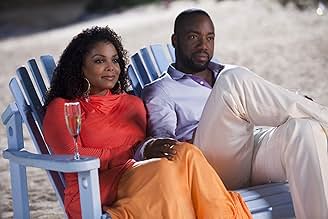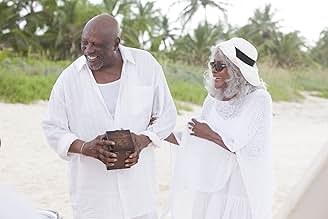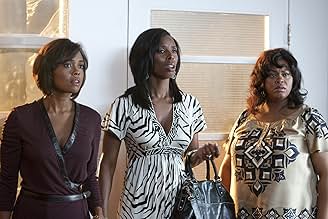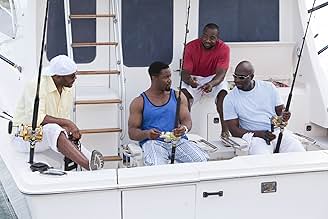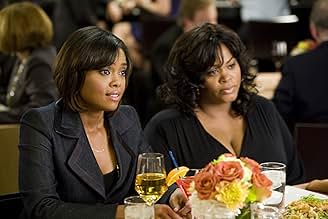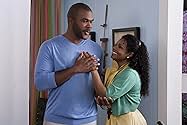AVALIAÇÃO DA IMDb
4,8/10
11 mil
SUA AVALIAÇÃO
Reunindo o mesmo elenco carismático da comédia dramática, Porque É que Me Casei?, Tyler Perry mostra o próximo capítulo da vida de oito amigos da faculdade que lutam contra os desafios da vi... Ler tudoReunindo o mesmo elenco carismático da comédia dramática, Porque É que Me Casei?, Tyler Perry mostra o próximo capítulo da vida de oito amigos da faculdade que lutam contra os desafios da vida conjugal em Por Que Eu Me Casei Também?Reunindo o mesmo elenco carismático da comédia dramática, Porque É que Me Casei?, Tyler Perry mostra o próximo capítulo da vida de oito amigos da faculdade que lutam contra os desafios da vida conjugal em Por Que Eu Me Casei Também?
- Direção
- Roteirista
- Artistas
- Prêmios
- 1 vitória e 5 indicações no total
Nia Iman Muhammad
- Kenya
- (as Nia-Iman Muhammad)
Avaliações em destaque
The Mrs (her choice of movies) & I walked out after 20 minutes or so & was allowed into another movie. I am not an actor but my gosh that was some really shallow acting. The setting was nice but very little action, elementary dialogue was rampant & too many close up's of actors faces. I thought the actors had recently memorized their lines & repeated them without any emotion or passion. The movies plot was weak & the photography and cameras set ups were below par. My suggestion #1, do not waste your money.Suggestion #2, Tyler Perry is living off the positive movies of the past & should get back to producing a more thoughtful & deeper movie content.
I am by no means a fan of Mr. Perry's work, I feel as though they movies are a simple formulaic ploy to pull cash out of the pockets of Black people. You say Jesus, roll your neck, cry a lot & then have a light skinned man save the day and there you go. This film provided all of that as usual, but was far better than the very low ratings would warrant or suggest. I believe in keeping it all real and the movie was good. Not great mind you, but good. I would like to see Perry open the door to some other struggling filmmakers and allow for greater creativity and choices, but I think he may be afraid of being shown up. Just my opinions here, but he really has got to do better or even better said we as Black people have to stop running behind anything with a Black face on the poster and make these filmmakers give us really really good movies to watch.
I was a bit too young to remember the last Tyler Perry movie I saw, and was never exposed to any of his actual plays. Thus, I held neutral expectations for "Why Did I Get Married Too," though I heard that its predecessor was quite good. I ALMOST left the theater taken aback at Perry's exceptional directing and understanding of human emotions. Unfortunately, that was all but squashed by one of the worst endings I've seen in a long time.
The plot is quite straightforward. Terry (Tyler Perry) and Diane (Sharon Leal) embark on their yearly couples retreat (sounds familiar?) with their friends, all of whom are also married. Marcus (Michael Jai White) and Angela (Tasha Smith) are constantly at odds with each other for any reason they (as in mostly Angela) can fathom, Troy (Lamman Rucker) and Sheila (Jill Scott) are battling the all-too-real consequences of unemployment, while Patricia (Janet Jackson) and Gavin (Mailk Yoba) serve as the model relationship for the group. The retreat is brought back to a harsh reality when Sheila's former husband, Mike (Richard Jones), unknowingly books time with the group's beach house for the weekend. His interruption, unbeknownst to the couples, tests their relationships as their own flaws slowly unravel and manifest themselves.
Perry's playwriting influences are made apparent right from the beginning, as each character behaves and builds in a play-like manner. This works strongly in his favor, as each character is developed well enough to bring significant amounts of powerful tension and drama later into the film. Perry also fiddles with the emotions of his audience like a puppet master, tossing them from angst to anger to happiness with incredible ease and lightning-fast timing. Every actor was stretched to their emotional limits in this film; I found Jackson's performance shockingly spectacular here and her conflict with Yoba to be one of the most intense partnerships I've seen in a while. In short, I felt like I was yanked from my seat and strapped onto the front of an emotional roller-coaster right from the beginning.
Unfortunately, that trains flew off the tracks into a horrible crash landing in the film's final ten minutes. While the ending was somewhat unexpected, it was certainly not the ending I *wanted* to expect. It was as if Perry waited an hour and 50 minutes to cram all of the clichéd, fantasy, happy-ending-feel-goodness Hollywood delivers in spades. The last two minutes were especially insulting. It was so appalling for me, in fact, that it made me spend the two hour train ride home realizing many of the other plot holes and unanswered questions Perry made irrelevant for me beforehand. I'm just going to assume that Perry didn't write the ending; it makes more sense.
All in all, the film is exceptionally well-made, incredibly moving and does not rely on its previous installment for the audience to wholly appreciate. Even despite its questionably poor ending, I highly recommend it.
The plot is quite straightforward. Terry (Tyler Perry) and Diane (Sharon Leal) embark on their yearly couples retreat (sounds familiar?) with their friends, all of whom are also married. Marcus (Michael Jai White) and Angela (Tasha Smith) are constantly at odds with each other for any reason they (as in mostly Angela) can fathom, Troy (Lamman Rucker) and Sheila (Jill Scott) are battling the all-too-real consequences of unemployment, while Patricia (Janet Jackson) and Gavin (Mailk Yoba) serve as the model relationship for the group. The retreat is brought back to a harsh reality when Sheila's former husband, Mike (Richard Jones), unknowingly books time with the group's beach house for the weekend. His interruption, unbeknownst to the couples, tests their relationships as their own flaws slowly unravel and manifest themselves.
Perry's playwriting influences are made apparent right from the beginning, as each character behaves and builds in a play-like manner. This works strongly in his favor, as each character is developed well enough to bring significant amounts of powerful tension and drama later into the film. Perry also fiddles with the emotions of his audience like a puppet master, tossing them from angst to anger to happiness with incredible ease and lightning-fast timing. Every actor was stretched to their emotional limits in this film; I found Jackson's performance shockingly spectacular here and her conflict with Yoba to be one of the most intense partnerships I've seen in a while. In short, I felt like I was yanked from my seat and strapped onto the front of an emotional roller-coaster right from the beginning.
Unfortunately, that trains flew off the tracks into a horrible crash landing in the film's final ten minutes. While the ending was somewhat unexpected, it was certainly not the ending I *wanted* to expect. It was as if Perry waited an hour and 50 minutes to cram all of the clichéd, fantasy, happy-ending-feel-goodness Hollywood delivers in spades. The last two minutes were especially insulting. It was so appalling for me, in fact, that it made me spend the two hour train ride home realizing many of the other plot holes and unanswered questions Perry made irrelevant for me beforehand. I'm just going to assume that Perry didn't write the ending; it makes more sense.
All in all, the film is exceptionally well-made, incredibly moving and does not rely on its previous installment for the audience to wholly appreciate. Even despite its questionably poor ending, I highly recommend it.
To appreciate why my review is below average you will need to see 'Why did I get married' Basically you have four couples in the original and each have their issues and by the end each issue is resolved one way or the other. So the problem for the sequel is how do you follow up on issues that have already been resolved. The answer is to create new issues or rehash old ones. This is how the sequel goes. So we have four couples each dealing with issues again. Now there's nothing wrong with that if the issues are plausible and played out properly and have credible endings. This is where 'Why did I get married too' goes sadly wrong. Some issues were credible but the endings were not or were not given an ending whilst the most prominent issue, well I'm struggling to understand what it actually was. I had no empathy with the female lead and felt that she should have been charged with crime and I think in real life most of those characters would have nothing to do with her after what she directly caused. Sadly this is a sequel that should never have been and I can only speculate that it failed because a certain actress only signed up for the sequel so she could have the most prominent role and in so giving it to her the movie failed. You will know to whom I refer when you watch this movie. So watch this movie if only to understand why a lot of sequels fail miserably as this one did!
Why Did I Get Married Too (2010)
I didn't see the first one, so can only approach this for what it was--an ensemble film that works with the problems of contemporary marriage. Yes, in particular this focuses on black America, but Perry seems to pull out the ways this part of the culture resembles American culture at large. And so there lies the flaw, in a way, of making much of this movie: it inevitably revisits familiar material. Does it do it well, or with freshness, or any edge of originality? Maybe only in the sense that it represents very very well to do African Americans, a segment not typical Hollywood fodder.
This isn't a rotten film, as some viewers like to say, but it isn't as well acted, sharply written, exquisitely filmed, or narratively interesting as it could have been by far. And it compares badly with Perry's wonderful "For Colored Girls." You might say this is ambitious--there are nine full blown main characters, each more or less equally dealing with their spouses--but in a way it is overwhelming, and for me at least I had trouble keeping all the story lines straight at first. But these narratives don't ever quite get fleshed out as fully as they need to be, both for their own sake, as small stories, but for the movie as a whole, since none of the content really goes deep. I don't mean it isn't emotional, but it's moving in a surface way.
If you do give this a shot, be aware that the second half of the movie is much better. It's less chitchatty, more serious, has better acting (including some really moving, intense stuff) and has the various plots intertwine and get a little edgy. But also be aware that none of this is especially well done. It rides in a style that might really be called prime time television, interesting but not amazing or transforming.
I didn't see the first one, so can only approach this for what it was--an ensemble film that works with the problems of contemporary marriage. Yes, in particular this focuses on black America, but Perry seems to pull out the ways this part of the culture resembles American culture at large. And so there lies the flaw, in a way, of making much of this movie: it inevitably revisits familiar material. Does it do it well, or with freshness, or any edge of originality? Maybe only in the sense that it represents very very well to do African Americans, a segment not typical Hollywood fodder.
This isn't a rotten film, as some viewers like to say, but it isn't as well acted, sharply written, exquisitely filmed, or narratively interesting as it could have been by far. And it compares badly with Perry's wonderful "For Colored Girls." You might say this is ambitious--there are nine full blown main characters, each more or less equally dealing with their spouses--but in a way it is overwhelming, and for me at least I had trouble keeping all the story lines straight at first. But these narratives don't ever quite get fleshed out as fully as they need to be, both for their own sake, as small stories, but for the movie as a whole, since none of the content really goes deep. I don't mean it isn't emotional, but it's moving in a surface way.
If you do give this a shot, be aware that the second half of the movie is much better. It's less chitchatty, more serious, has better acting (including some really moving, intense stuff) and has the various plots intertwine and get a little edgy. But also be aware that none of this is especially well done. It rides in a style that might really be called prime time television, interesting but not amazing or transforming.
Você sabia?
- CuriosidadesJanet Jackson broke three titanium golf clubs in her rampage scene.
- Erros de gravaçãoEarly on, when the four women go inside the house for margaritas, two of the four are wearing different dresses, the other two the same dresses as in the prior scene.
- ConexõesFeatured in The Tonight Show with Jay Leno: Episode #18.14 (2010)
- Trilhas sonorasInto the Oh
Written by Jay Weigel
Performed by Bitter End
Published by Music of Melpomene (BMI)
Courtesy of Carondelet Music Group, LLC
Principais escolhas
Faça login para avaliar e ver a lista de recomendações personalizadas
- How long is Why Did I Get Married Too??Fornecido pela Alexa
Detalhes
- Data de lançamento
- País de origem
- Central de atendimento oficial
- Idioma
- Também conhecido como
- Why Did I Get Married Too?
- Locações de filme
- Empresas de produção
- Consulte mais créditos da empresa na IMDbPro
Bilheteria
- Orçamento
- US$ 20.000.000 (estimativa)
- Faturamento bruto nos EUA e Canadá
- US$ 60.095.852
- Fim de semana de estreia nos EUA e Canadá
- US$ 29.289.537
- 4 de abr. de 2010
- Faturamento bruto mundial
- US$ 60.673.972
- Tempo de duração2 horas 1 minuto
- Cor
- Mixagem de som
- Proporção
- 1.85 : 1
Contribua para esta página
Sugerir uma alteração ou adicionar conteúdo ausente

Principal brecha
By what name was Por Que Eu Me Casei Também? (2010) officially released in India in English?
Responda






